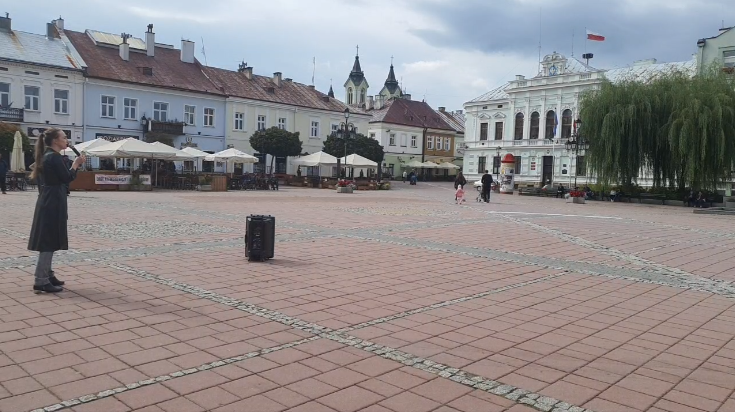A protest against the reception of Ukrainian refugees in a town near Poland’s border with Ukraine at the weekend attracted no participants. Meanwhile, another event in Warsaw – at which two nationalist MPs spoke – drew only a small crowd.
Figures from the nationalist Confederation (Konfederacja) have in recent weeks been promoting the slogan “Stop the Ukrainisation of Poland”. The party, which has long been opposed to mass immigration from Ukraine, claims that Ukrainian refugees are being given “privileges” not granted to Poles.
On Saturday, the party promoted a march and protest in Warsaw against the “threats posed by the massive influx of people from Ukraine”. One of Confederation’s leaders, Grzegorz Braun, called on all “Polish patriots” opposed to the “de-Polonisation and Ukrainisation of Poland” to attend.
📢 Uczestniczyliśmy dziś jako @RuchNarodowy w #Warszawa w marszu #StopUkrainizacjiPolski. Głos w imieniu 🇵🇱 #RN zabrał @krzysztofbosak.
Nasza partia od zawsze kieruje się zasadą #PoPierwszePolska #PoPierwszePolacy❗ pic.twitter.com/I34pySu2Ay
— Aleksander Kowaliński 🇵🇱 (@AKowalinski) September 24, 2022
On the day, between 150 and 200 people turned up, report Gazeta Wyborcza and Kresy.pl. They marched from Parade Square to the presidential palace, with one placard reading: “President [Andrzej Duda], you did more in one month for Ukrainians than in seven years for Poles.”
Participants also displayed banners with the logos of far-right groups All-Polish Youth (Młodzież Wszechpolska) and the National Movement (Ruch Narodowy). Among those to speak to the crowd were Braun and another of Confederation’s leaders, Krzysztof Bosak.
Bosak accused the Polish government of “pursuing a policy [to support refugees] beyond the financial capacity of Polish citizens”. He pointed to the rising prices of housing and the costs of providing benefits to Ukrainians as evidence.
A group of counterprotesters held signs saying “Down with fascism”, “Braun to Moscow” and “Poland is home to everyone”.
Panie Pośle, moja 7-letnia siostra chodziła do polskiej szkoły w kwietniu, ale już wróciła na Ukrainę. Schodzi do schronu jak wyją syreny. Te rodziny, które tutaj zostały, często nie mają gdzie wracać. Jak można w czasie wojny za wschodnią granicą mówić o ukrainizacji Polski? https://t.co/exGlRVVNoQ
— Alina Makarczuk (@Alina_Makarczuk) September 24, 2022
On Sunday in Sanok, a town of 37,000 in southeaster Poland near the border with Ukraine, Karolina Pikuła, a Confederation activist and associate of Braun, organised another protest against the “Ukrainisation of Poland” on the market square.
However, during the event – which Pikuła streamed live on YouTube – no one turned up. The only interest shown was from a man who came to argue with her.
After Polish media reported on the lack of turnout, Pikuła, who has also tried to organise other protests in the region, defiantly tweeted that “we will continue to relentlessly do our work [against] the deliberate colonisation of Poland by Ukraine” and that she “will talk even to the first passerby”.
The far right organised an anti-Ukrainian protest in the town of Sanok and precisely zero people turned up.
For years Polish nationalists have tried to stir up hatred towards Poland's large Ukrainian migrant (and now refugee) community. But they have consistently failed pic.twitter.com/0BmR1YiFcl
— Daniel Tilles (@danieltilles1) September 25, 2022
Poland has been the largest recipient of refugees from Ukraine, millions of whom have crossed its border since Russia’s invasion in February. It is estimated that between 1 and 1.5 million remain in the country, as well as a similar number of Ukrainians who have previously migrated to Poland.
Poles have been overwhelmingly welcoming of the arrivals. A poll in July showed that 77% of the public had been involved in helping refugees, spending around 9-10 billion zloty (€1.93-2.14 billion) out of their own pockets on doing so.
Other polling has shown overwhelming support for Ukraine in its defence against Russian aggression, and for the Polish government’s strong pro-Ukrainian and anti-Russian stance.
However, from the early stages of the crisis, Confederation – which has 12 MPs in parliament – and other far-right groups have sought to raise concern about the mass influx of Ukrainians and the impact it could have economically, politically and culturally on Poland.
In recent weeks, the hashtag #StopUkrainizacjiPolski (#StopTheUkrainisationOfPoland) has often been trending on Twitter. However, analysis by the Atlantic Council’s Digital Forensic Research Lab found that it had been boosted by “inauthentic” activity from “accounts exhibiting signs of bot-like behavior”.
Research by state pollster CBOS found that, whereas in March only 3% of the public believed Poland should not accept Ukrainian refugees from conflict zones, by July that had risen to 11%.
A largely inauthentic network in #Poland pushed an anti-Ukrainian refugee hashtag to trending. Its primary accounts created a false impression regarding its relative popularity in the country.https://t.co/APAkKqr3ux
— DFRLab (@DFRLab) September 4, 2022
Main image credit: Karolina Pikuła/Facebook (screenshot)

Daniel Tilles is editor-in-chief of Notes from Poland. He has written on Polish affairs for a wide range of publications, including Foreign Policy, POLITICO Europe, EUobserver and Dziennik Gazeta Prawna.




















